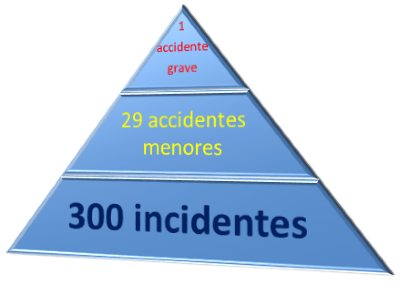
16 Aug Those little things
Some summers ago, and I think it has been a few summers already, one of the best-known beer makers, DAMM, launched a TV ad to promote their brand. The commercial, which I recommend that you watch, is “Those Little Things” –only available in Catalan and Spanish–, and watching it has inspired me to write this blog.
What I want to tell you is that in Rieusset we have been working on the “little things” for quite some time now because we believe that managing these has great bearing on the business objective.
Do you know “Heinrich’s Law”?

He said that if we want to reduce the number of serious injuries we must also occupy ourselves with the prevention of incidents and accidents with minor personal injuries, since the number of the latter is proportional to the former.
So as you can see, Mr. Heinrich suggested that we take care of “the little things” in order to avoid the consequences that cause the bigger ones.
However, if we jog our memory surely we all recall the concept of chaos theory, developed by Mr. Edward Lorenz, renown meteorologist and mathematician, regarding the sensibility to slight variations in initial conditions and the effects on weather prediction in the long term. This became known as the Butterfly Effect. “When a butterfly flaps its wings this causes a hurricane on the opposite side of the earth”. Does this ring a bell? Chaos theory talks about how insignificant things have a critical influence on the final result.
Hasn’t it ever happened to you that an argument about the traffic while going to work influenced how your day went?
I think that at this point some of you might agree with me that by managing the “little things” we can improve. And that is exactly what we do in Rieusset.
And how?
Well, it’s as easy or as difficult as looking for them and facing them.
Many times they are not easy to see. They make up part of our daily environment and we are so used to having them there that even if we walk right in front of them we don’t see them. We could also go so far as to say that the corporate culture has an influence on this, but I am not going to address this aspect, since it is much more complex and abstract. Instead I would say that it has very much to do with habits. We are so used to doing things in a certain way that we don’t conceive doing them any other way. “I have always done it like this”. Does this sound familiar?
And how do we look for them in Rieusset?
Quite simply by observing and questioning ourselves about everything.
There are questions that we have all asked ourselves. For example, why have we produced more waste in this order? Why did this machine stop occur? Why has this order been in this process for so long? Why have we followed this order in planning? etc.
But there are other questions –and this is where I get to our “little things” – that we don’t usually ask ourselves.
Why is this pallet in the middle of the transit area? Why has this ladder been near the blocked material area for so long? Why is there no identification on the wastage cage? Why are there missing tools on the tools panel? Why is an area messy? Why is there no cover on an electrical cable trunking? Why was the form for a preventive task or self-monitoring sheet not filled out?
By answering these questions we can reduce the risk of accidents (and thus absenteeism), minimize machine stop times or reduce the movement of employees, recover waste, etc.
But we don’t only ask ourselves questions related to production. If we think about the administrative part we can ask: why don’t we request taxi invoices to be made out to the company name? Why are all messenger services always urgent? Why do we make so many photocopies and distribute them daily? Why are there three people with the same task?
These are only examples of the questions that when raised openly seem obvious but which our day-to-day routine does not always allow us to ask ourselves. However, if we do ask them, they can unveil the answers that lead us to improve with regard to generating savings as well as improving processes.
One of the tools I use to bring out these questions is that I invite newly contracted employees to question everything. Since these people are not yet influenced by our company’s handicaps, and drawing upon their past experiences, they can provide us with fresh ideas or at least new questions so that we may reassess our ways of doing things. My recommendation is that you use this tool even with sporadic visitors like suppliers and customers.
In conclusion, I would like to add the observation that although they are “little things” this does not mean that they are always easy nor that we can always resolve them ourselves. But if we are committed to solving them, if we are aware that through them we can have a great bearing on the good functioning of the company, then success is guaranteed.
I invite you to look for the “little things” and make an impact on them.
| We Manufacture: | Meet Rieusset: |




